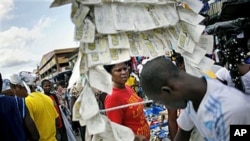Ivory Coast's military leaders say they are starting to deploy additional troops to ensure security for Sunday's presidential run-off election.
Official campaigning is under way in Ivory Coast for the run-off between President Laurent Gbagbo and former Prime Minister Alassane Ouattara. This election is the country's first presidential poll since the start of a civil war in 2002 that split the country between a government-held south and a rebel-held north.
A security force, comprised of half government troops and half former rebel fighters, is responsible for securing the poll nationwide. Only around half of the 8,000 soldiers planned for the first round of polling October 31 were deployed due to organizational and funding issues.
Military leaders say Monday marks the beginning of the deployment of an additional 4,000 troops for the second round of polling.
Army chief General Phillipe Mangou said the purpose of this deployment is to secure the electoral process. He said the military is deploying an additional 1,500 soldiers to the rebel-held North, West and center regions of the country to mix with former rebel troops, the New Forces, who will deploy an additional 500 soldiers there. In the south, he said the New Forces will deploy 1,500 soldiers and the government will send out an additional 500.
Mangou said these soldiers have been instructed to protect voters from intimidation and their presence should reassure voters. He also said text messages and rumors are circulating that there will be problems, but anyone who wishes to disrupt the electoral process or engage in violence will be dealt with accordingly.
There are fears that disagreements surrounding the run-off election could re-ignite violence, and tensions are mounting in the country's largest city, Abidjan, as campaigning heats up.
On Sunday, outside a university dormitory in Abidjan, a confrontation between pro-Gbagbo students and youth opposition supporters turned violent and had to be broken up by police.
Ouattara has accused President Gbagbo and his party of introducing violence into Ivorian politics in recent years, while Mr. Gbagbo accuses Ouattara, who is from the north, of being behind the 2002 rebellion, a charge Ouattara denies.
The United Nations Operation in Ivory Coast continues to call for calm during the electoral process.
Ivory Coast to Bolster Security for Presidential Run-Off




